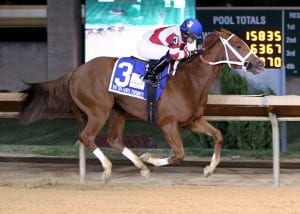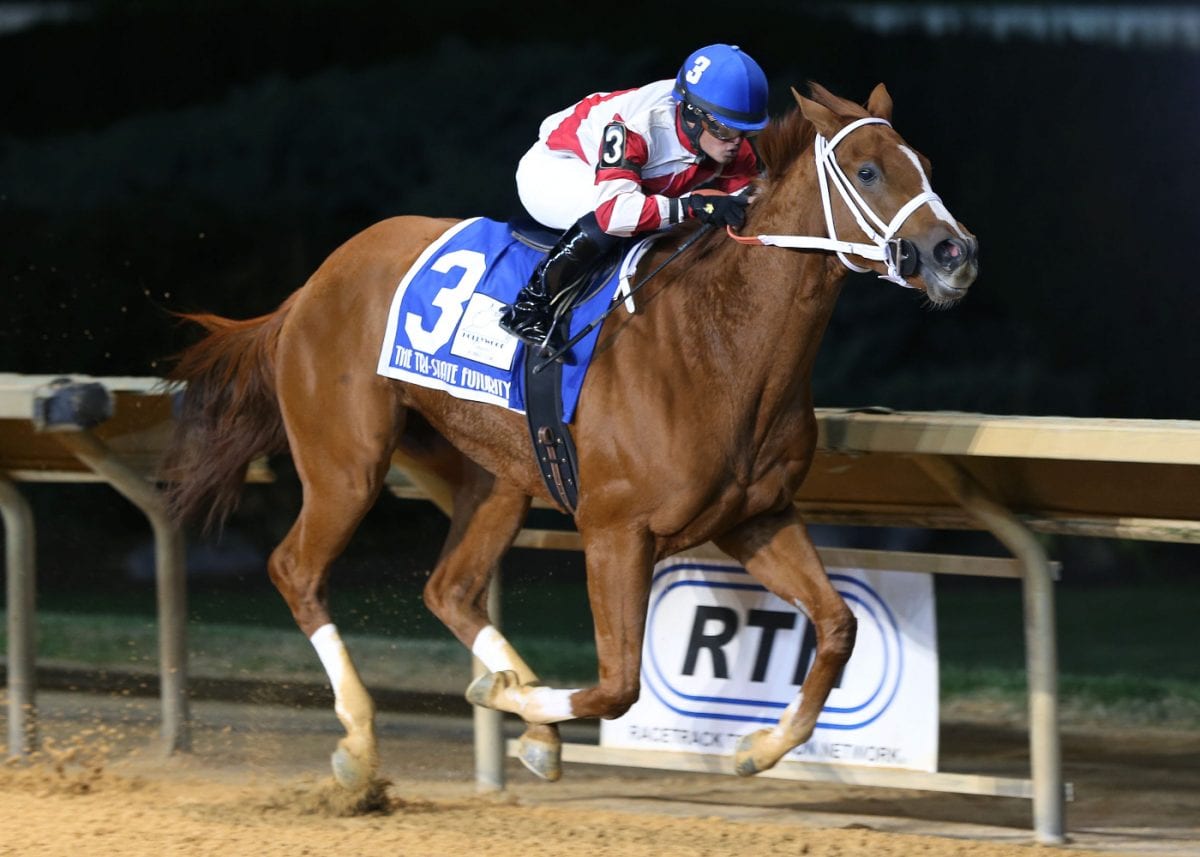
Unbeaten Amherst Street, trained by Javier Contreras, is one of many recent breeding and racing success stories in West Virginia. Photo by Coady Photography.
by Jeff Nations
West Virginia’s thoroughbred horse racing industry may well have avoided a fatal blow from the state legislature. But a bill awaiting Governor Earl Ray Tomblin’s signature promises to continue the slow and steady bleeding for those connected to the sport in the Mountain State.
The adoption over the weekend of an amended version of HB 4333 (SB 385), the so-called “Haircut Bill,” by Sen. Herb Snyder (D-Jefferson) seemed to spare the beleaguered industry the most objectionable parts of the original legislation. Instead of a 15 percent “off the top” cut of distributions from video lottery and table games revenue dedicated to purses and breeding, Snyder’s amended bill — SB 1001 — reduced the purse cut to 10 percent. And, in lieu of the original bill’s language making racing’s subsidies appropriated, rather than mandatory funds, SB 1001 preserved the original intent of the Video Lottery Act and the Table Games Act to mandate dedicated funds for horse racing and greyhound racing in the state.
Still, the bill reportedly will cut around $5 million from purses, with Thoroughbred breeding taking an addition $538,000 hit. The racetracks themselves will also see funding in the Racetrack Modernization Fund, which supports so-called “facility modernization improvements,” cut by 10 percent, or $1 million.
But Charles Town Horsemen’s Benevolent and Protective Association (CTHBPA) President Raymond “Randy” Funkhouser said additional language inserted in the bill — not part of Snyder’s amendment — pertaining to the 2005 Workers Compensation Reduction Bill will have a further damaging effect. The 2005 bill had diverted certain slots revenues originally targeted dedicated to racing and breeding to filling a deficit in the state’s workers’ compensation program. That bill had a “sunset” provision, which would have reinstated diverted revenues back to the purse and breeder development funds once the debt had been satisfied. But HB 1001 directs that money instead back to the state’s Excess Lottery Revenue Fund and subject to appropriation.
“Now we have no chance of increasing funds in the future,” Funkhouser said.
With gaming revenues drastically reduced since the introduction of slot machines and table games in neighboring Maryland and Pennsylvania in recent years, the loss of that potential revenue boost down the road could serve to discourage owners from sending their horses to West Virginia.
Charles Town-based trainer Javier Contreras said the reduced purse structure — “I think 10 percent, we can survive” — could still have a serious impact on racing in the state. Contreras, who convinced some of his biggest clients to breed and race horses in West Virginia, can’t blame those owners for eyeing Maryland based on the current uncertainty and declining purses at Charles Town and was considering his own options Saturday shortly before the final 10 percent reduction — instead of 15 percent, and the associated legislative control of funds — became known.“It’s tempting, very tempting,” Contreras said of shifting his operation to Maryland. “I trained there for many years, won a lot of races there, too. To me, if it goes that bad I’ve got to go. I can’t stay here. I can’t make a living. A lot of people that work for me are going to be hurting.”
[pullquote]I don’t know if they realize what the industry means to this county. A lot of people put a lot of work and a lot of money into it.” — Javier Contreras[/pullquote]“[T]o me, it’s going to be devastating. I don’t know if they realize what the industry means to this county. A lot of people put a lot of work and a lot of money into it. I moved up here for the same reason. I didn’t want to move around anymore, you know. I was thinking of buying a farm — I’m glad I haven’t bought it yet — but I’ve got three or four mares that are breeding West Virginia-breds.”
Funkhouser said the CTHBPA will meet later this week to discuss its next move. One item the group had considered but has pledged not to employ — not at present, anyway — is the “nuclear option,” in which the group would circulate petitions in Jefferson County for referendum recall on gaming issues. The threat of eliminating those sources of revenue is a powerful, albeit fatal, card still held by the horsemen. Such a move, if ultimately effective, could potentially shut down the track.
“If we do that, then we really hurt everybody — including us,” Contreras said.
Leading trainer Jeff Runco, a member of the CTHBPA board, thinks the industry can survive with the current 10 percent reduction. There will inevitably need to be some changes to make that feasible for the horsemen, something the board plans to discuss at its meeting.
“It’s workable,” Runco said. “You’ve got to understand — we run 235 dates, which is a lot of days. We’ll probably have to scale back some days and work with the track. We’d like to keep the purses the same and I think we will keep the purses the same. We’ll just have to see. We’re going to talk about it with the HBPA and with the track and figure out the best thing would be to keep the racing good, which we will.”
The racing may go on at Charles Town, but the damage to West Virginia’s breeding industry could be even more severe. Since the passage in 1984 of the Thoroughbred Development Fund Act, West Virginia has boasted one of the nation’s most stable and innovative breeding programs. The number of West Virginia-bred foals has risen significantly, from 174 in 1996 to more than 500 in 2012, according to The Jockey Club. And their quality has improved.
[pullquote]“A breeder is no different from any other business. You’re investing money for the opportunity of getting a profit down the road, and in this case it’s about a four-year investment. All of this legislative finagling has created an aura of instability.” — Randy Funkhouser[/pullquote]But recent success stories like Kentucky Derby-nominated 3-year-old Giovanni Boldini (bred by Jefferson County’s Buck Woodson) and Kentucky Oaks nominee Aurelia’s Belle (bred and owned by Morgan County’s Jim Miller) could become rare indeed if discouraged owners choose other states to spend money breeding and boarding their horses.
Funkhouser would like to see Charles Town owner Penn National Gaming take a more active role in developing alternative revenue sources for racing, including better promotion locally and by seriously looking into options like pushing for advanced deposit wagering in the state. Until steps are taken to replace at least some of the lost purse revenue, Funkhouser sees a further decline for the breeding industry.
“We probably have one of the best programs for breeding horses in the United States,” Funkhouser said. “Now we’re going to chop it off at the knees.
“A breeder is no different from any other business,” he added. “You’re investing money for the opportunity of getting a profit down the road, and in this case it’s about a four-year investment. All of this legislative finagling has created an aura of instability.”
(Featured image, of Amherst Street, by Coady Photography.)













